6 Tips to Get Rid of Crepey Skin, According to Beauty Experts and Dermatologists
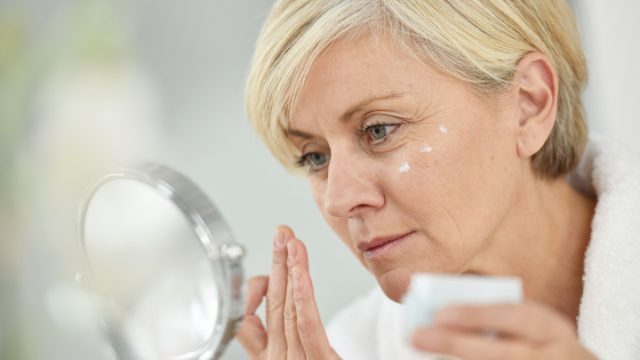
Crepe paper is a fun decoration for birthday parties. French crêpes are a delicious lunch. And a crepe blouse is a versatile closet staple. All good! But crepey skin is another matter. “None of us beauty seekers want it,” says Jill Harth, makeup artist and CEO of Beauty & Grace, Inc. “You’ll certainly know crepey skin when you see it,” she explains, describing it as “thin, delicate, wrinkly, and dry looking.”
Harth points out that preventative measures are key in the battle against creping. “The earlier you start using sunscreen and incorporating it into your daily life, the less chance you will end up with the ‘crepe.’ Proper nutrition, keeping a stable weight, [and] refraining from excessive drinking and smoking will keep your skin plumped, healthy, and beautiful.”
If you already have crepey skin, fear not. There are several expert recommendations that will help smooth out skin and keep it healthy. Keep reading to hear from Harth and dermatologists about their top tips.
READ THIS NEXT: Sandra Bullock Swears by This $7 Drugstore Product for Youthful Skin at 57.
1
Moisturize, moisturize, moisturize.
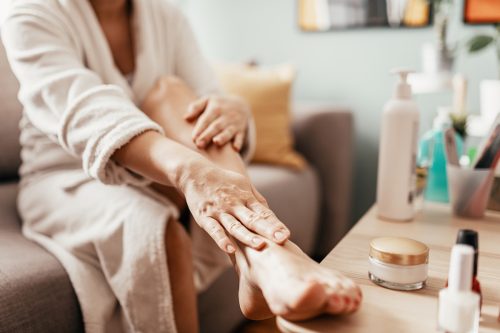
Hydrating and moisturizing help address creping in several different ways. According to U.S. Dermatology Partners, drier skin is prone to wrinkling. In addition, “the sun’s ultraviolet (UV) rays are very destructive and can break down collagen and elastin in the skin,” the site explains. “These are the proteins that give our skin its smooth, healthy, youthful appearance, so the combination of reduced moisture retention and destruction of the collagen and elastin leaves skin looking wrinkled and less taught.”
“I make sure the skin stays moisturized to plump [it] up,” Harth says. “I recommend using products with ingredients like coconut oil, shea butter, and even petroleum jelly, which is a terrific sealant for skin.”
2
Treat your skin at night.

Nighttime is a great time to address skin problems like creping. “During the day, your skin is in a protective state, warding off elements such as sun damage or oxidation, versus at night [when] your skin goes into renew mode, regenerating new skin cells and cycling oxygen and nutrients,” dermatologist Dennis Gross, MD, says on his site. “This topic of ‘getting your beauty sleep’ has so much history in both culture and science [and] there is a truth to this saying.”
READ THIS NEXT: The No. 1 Thing You Shouldn’t Be Doing With Your Skin After 50.
3
Wash your face.
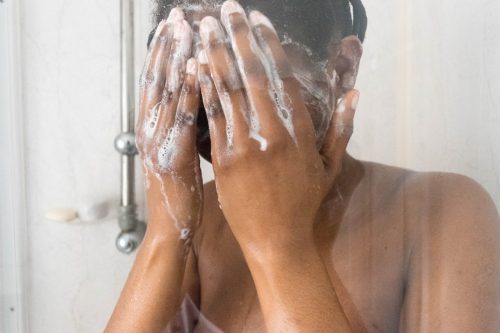
Washing your face twice a day—in the morning after a night of skin-boosting nutrients and before bedtime after a day of moisturizing—is important “no matter your skin concern, but for those with crepey skin, it’s essential as it sets the stage for the entirety of your crepe-combatting regimen,” notes Byrdie. “It’s a time to wash off dirt, oil, and impurities from the day and create a polished surface for the rest of your products to shine.”
4
Know your ingredients.
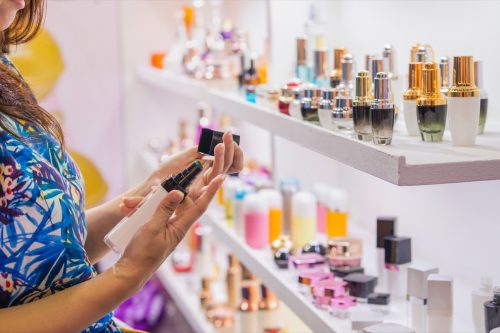
“As a nightly treatment to correct, reverse, and smooth out the look of crepiness, I use products with peptides, vitamin C, and retinols,” says Harth. Each of these components works in its own way.
“Peptides signal your skin to enter repair mode and produce more collagen and elastin, two proteins responsible for keeping skin smooth and firm,” Melissa Doft, MD tells Cosmopolitan.
A diet high in antioxidants “can help support the health of your skin and the rest of your body, [and] Vitamin C in particular may be beneficial for skin health because it plays a role in collagen production,” says Healthline. And retinols “boost the production of elastin and collagen, which creates a ‘plumping’ effect that can reduce the appearance of fine lines, wrinkles, [and] enlarged pores,” the site explains.
For more beauty news sent directly to your inbox, sign up for our daily newsletter.
5
Use makeup (but not too much).
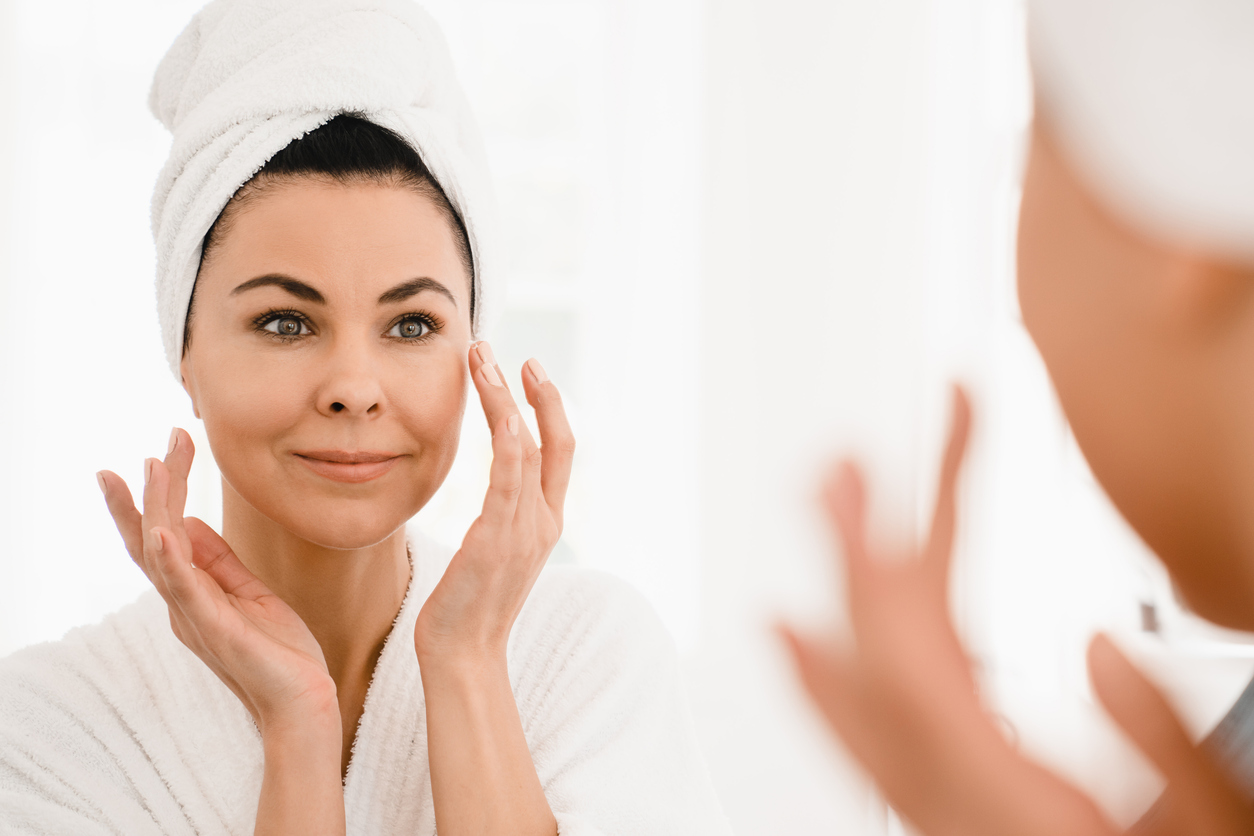
When it comes to camouflaging crepey skin, Harth cautions that less is more. Your goal? “Moisturizing to smooth the skin and a little color to even out the skin texture,” Harth says. “I like using tinted primers, sheer mineral tints, and blurring makeup primers.”
Just a “drop” of rose glow oil will help plump the skin, and Harth suggests finishing your look with the same minimalist approach. “To set the look, use some invisible blotting powder [and apply] lightly with a powder brush, sponge, or puff,” she says. “A big no-no is adding too much or too thick makeup, which will exacerbate the look of the crepeiness—and who wants that?”
6
Eat healthy.

Living an all-around healthy lifestyle is a crucial component of an effective skincare routine—and this includes eating a balanced diet. The Cleveland Clinic recommends foods such as fruit, vegetables, whole grains, and legumes, to help “nourish your skin from the inside out.”
“The healthier the foods are that you consume, the better your skin will look,” clinical nutritionist Samantha Heller, MS, RD, tells WebMD. “Everything you eat becomes a part of not only your inner being, but the outer fabric of your body as well.”